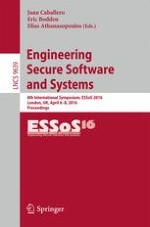2016 | OriginalPaper | Buchkapitel
Idea: Usable Platforms for Secure Programming – Mining Unix for Insight and Guidelines
verfasst von : Sven Türpe
Erschienen in: Engineering Secure Software and Systems
Verlag: Springer International Publishing
Aktivieren Sie unsere intelligente Suche, um passende Fachinhalte oder Patente zu finden.
Wählen Sie Textabschnitte aus um mit Künstlicher Intelligenz passenden Patente zu finden. powered by
Markieren Sie Textabschnitte, um KI-gestützt weitere passende Inhalte zu finden. powered by
